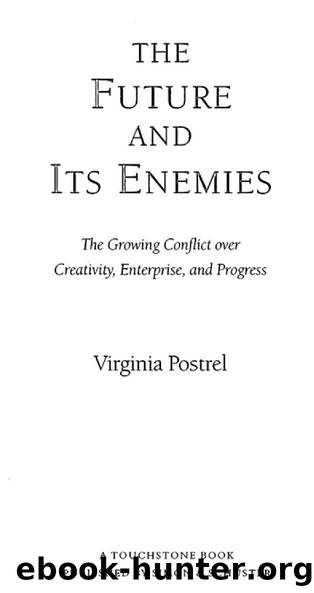The Future and Its Enemies by Virginia Postrel

Author:Virginia Postrel
Language: eng
Format: epub
Publisher: Simon & Schuster
Published: 2011-05-10T00:00:00+00:00
CHAPTER SIX
CREATING NATURE
Eden is in Western myth the unchanging and pristine paradise, lost through overreaching and lamented ever since. In the biblical story, however, Eden is more complicated. It is a living, growing place whose life depends on water and human labor. 1 God plants the garden only after he has created man from the ground, and he charges Adam to work and keep the garden: to both improve and preserve it. 2 Humanity is to be the source of both change and stability. Adam is part of nature—his very name springs from the earth, adamah —yet he is also distinct from it.
Of course, no sooner has God created man, animals, and woman than the creator loses control of his creation. Genesis is the original Frankenstein myth. That man and nature could defy God has provoked theologians for centuries. We can leave the theological puzzles aside, however. Genesis suggests truths that do not depend on a particular religious tradition: Even in Eden, humanity occupies a garden, a place between static order and wild nature, á place we both work and keep. And no creation is completely under its creator’s control. The world changes almost as soon as it is formed, and so does humanity. They change each other.
Yet the ideal of the untouched paradise, of orderly nature undisturbed by human action, still shimmers in many imaginations. Nature is a source of moral authority for some, of security for others. It offers standards and models. It is autonomous and eternal. “The chief lesson is that the world displays a lovely order, an order comforting in its intricacy,” writes Bill McKibben in his best-selling book, The End of Nature. “And the most appealing part of this harmony, perhaps, is its permanence—the sense that we are part of something with roots stretching back nearly forever, and branches reaching forward just far.” 3 Throughout its long history, this image suggests, nature has not really changed. Its harmony and order are permanent, reminders of the beauty of stasis.
Changeless nature is not just a matter of utopian dreams. Those who seek stasis in the human world argue that they are following nature’s way, that dynamism is not merely disruptive but unnatural. “The characteristic that best distinguishes flourishing ecosystems is never growth, but rather stability (a conservative virtue in its own right),” writes John Gray, the British philosopher, in his appeal for conservatives and greens to join forces. “This is a truth which is acknowledged in the discipline of ecology in all of its varieties. … Modernist political faiths which advocate the unlimited growth of population, production and knowledge … are effectively in rebellion against every truth we have established about order in the natural world” (emphasis added). 4 The open-ended future of discovery and learning is not merely disruptive but downright perverse. The infinite series, Gray maintains, defies the natural order of things.
Clearly, how we think about nature—and about artifice—informs how we think about the growth and evolution of human societies. If what is given by nature is good by definition, then to change it is evil.
Download
This site does not store any files on its server. We only index and link to content provided by other sites. Please contact the content providers to delete copyright contents if any and email us, we'll remove relevant links or contents immediately.
Cecilia; Or, Memoirs of an Heiress — Volume 1 by Fanny Burney(31324)
Cecilia; Or, Memoirs of an Heiress — Volume 3 by Fanny Burney(30928)
Cecilia; Or, Memoirs of an Heiress — Volume 2 by Fanny Burney(30885)
The Great Music City by Andrea Baker(21195)
We're Going to Need More Wine by Gabrielle Union(18065)
Bombshells: Glamour Girls of a Lifetime by Sullivan Steve(13101)
Pimp by Iceberg Slim(12923)
All the Missing Girls by Megan Miranda(12739)
Fifty Shades Freed by E L James(12443)
Norse Mythology by Gaiman Neil(11874)
Talking to Strangers by Malcolm Gladwell(11861)
Crazy Rich Asians by Kevin Kwan(8341)
Mindhunter: Inside the FBI's Elite Serial Crime Unit by John E. Douglas & Mark Olshaker(7827)
The Lost Art of Listening by Michael P. Nichols(6462)
Enlightenment Now: The Case for Reason, Science, Humanism, and Progress by Steven Pinker(6403)
Bad Blood by John Carreyrou(5761)
The Four Agreements by Don Miguel Ruiz(5502)
Weapons of Math Destruction by Cathy O'Neil(5029)
We Need to Talk by Celeste Headlee(4861)
